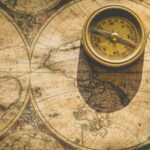The aim of Geography Awareness Week, which occurs every third week of November, from November 17–21 this year, is to raise awareness about the significance of geography to everyone’s lives and encourage people to consider their relationship with the environment. Did you know that the word ‘geography’ was first used by Eratosthenes of Cyrene (276 B.C.–194 B.C.) in the title of his book “Geographica”? Geography is the term for the study of places and how people relate to their environments. It is a field that touches other disciplines, including geology, botany, economics, sociology, and demographics. Geography Awareness Week was created by “National Geographic” and became established by a presidential proclamation in 1987.
History of Geography Awareness Week
Geography existed before human beings, but we never studied it until we became capable of thoughts and more aware of our environment. Although Eratosthenes first used the word geography, the ancient Greeks believed Homer, through his poetic works, “The Iliad” and “The Odyssey”, was the founder of geography. However, it was Thales of Miletus who created many of the astronomical and mathematical rules that served as a foundation for the scientific study of geography.
Under Roman rule, geography flourished and was used to further the empire’s development and expansion. The ancient Romans used geographical systems to construct a transportation system, which consisted of 50,000 miles of road. They were also employed in building canals, aqueducts, tunnels, mines, and in military expeditions. One of the significant maps of that time is the Peutinger Table, which includes the entire Roman Empire (the Middle East, Britain, and Africa), China, India, and Sri Lanka.
As individuals such as Marco Polo began to explore the known world in the 13th century, geography developed, and more people were encouraged to embark on similar explorations. The Portuguese and Spanish also contributed to the development of geography between the 15th and 16th centuries. Significant promoters of geographic studies of that time include Richard Hakluyt, Theodore de Bry, and Giambattista Ramusio.
In the 18th century, geography became recognized as a discipline and was included in university curricula across Europe. However, in Britain, it was taught as a sub-discipline. In 1830, the Royal Geographical Society was founded in Britain, and 58 years later, the National Geographical Society was founded in the United States. Geography continued to develop and expand in the 20th and 21st centuries, spanning various areas of human lives and our relationship with the environment. It has since undergone numerous transformations and is expected to do so again in the future.
Geography Awareness Week timeline
The word ‘geography’ first appears in the title of Eratosthenes’ book “Geographica”.
The Babylonian Map of the World (or ‘Imago Mundi’) is etched into a clay tablet.
Universalis Cosmographia, a map by the German cartographer Martin Waldseemüller, becomes the first map in which the word ‘America’ is mentioned.
The National Geographic Society is founded in the United States and becomes a significant popularizer of geography globally.
Geography Awareness Week FAQs
Who is the father of geography?
Eratosthenes is considered the father of geography as he was the one that developed the early foundation of the discipline.
What are the three main branches of geography?
Physical geography (nature and how it affects people and/or the environment); human geography: (this relates to people); and environmental geography (how people can possibly harm or protect the environment).
What career options are there in the field of geography?
There are a number of career paths one can follow if you study geography, such as Agricultural Manager, Land Economist, Urban Planner, Climatologist, and Geographic Information Systems (GIS) Analyst, to name a few.
How To Observe Geography Awareness Week
Organize a Geography Awareness Week event
Geography Awareness Week is all about educating people on how we interact with our environment and the importance of geography. If you are knowledgeable about geography, you can educate people about it in an exciting format or invite a guest speaker to do that. You can film screenings, host a trivia night or contest, or organize a speaker series. Whatever you decide, you first need to secure a venue. This can either be a public space or your home — if you want to keep it to just family and close friends. Send out invites and prepare the necessary logistics. You can expand on these using the resources available on the “National Geographic” website.
Go geocaching
Geocaching presents an opportunity to build on your navigation skills, map-reading, and the use of GPS. You also get to explore new places at the same time. If you are an outdoorsy person, geocaching is for you. The activity involves using GPS to hide and seek geocaches (containers with treasures). Check the Geocaching website for how you can get started.
Go EarthCaching with friends
EarthCaching is another form of geocaching. It provides an exciting way to learn about your environment and its natural processes. You can organize an EarthCaching field trip with your friends or colleagues. And if you’re a teacher, EarthCaching presents the perfect way to teach your students geography. EarthCaching and Geocaching websites offer several resources on this activity.
5 Incredible Facts About Geography
Antarctica is the largest desert globally
At 5.5 million square miles, with a climate that prevents plants and animals from thriving, Antarctica stands as the largest desert in the world.
Russia is home to 11 time zones
When one end of Russia is starting their day, the other end is winding down — 70 times bigger than the United Kingdom, Russia is the largest country globally, straddling two continents and covering 6.6 million square miles.
The Northern Hemisphere is home to almost everyone
Nearly 90% of the world’s population, 7.7 billion people, lives in the Northern Hemisphere (the half of the Earth to the north of the Equator).
Mount Chimborazo is the Earth’s highest point
Although not taller than Mount Everest, Mount Chimborazo in Ecuador is the highest point on Earth — that is because its location on the Equator makes it 7,000 higher in the sky than Mount Everest.
The Pacific Ocean is shrinking
Every year, North America and Asia get closer to each other, reducing the distance between the continents and the size of the Pacific by 2–3 centimeters.
Why Geography Awareness Week Is Important
Geography helps us address global challenges
Climate change and variability, rapid biodiversity loss, and deepening inequalities are issues that threaten our existence now and in the future. Geography is a discipline that touches many other disciplines, like physics, chemistry, geology, political science, and sociology. That allows us to leverage it to delve deeper into the root causes of these challenges and develop solutions for them.
Geography helps us understand our environment and the Earth
Geography offers the knowledge and tools to understand the various natural processes and Earth systems. It demonstrates how our activities affect the planet and how interconnected we are. For example, an increase in global temperature due to human activities can drastically impact climate patterns, forcing us to adapt to how we live.
Geography builds navigation skills
Understanding your location in relation to your environment by using landmarks, telling north from south, using maps to navigate your way in an unknown area, or how to use GPS are some of the navigation skills that geography helps us develop.
Geography Awareness Week dates
| Year | Date | Day |
|---|---|---|
| 2024 | November 11–15 | Monday–Friday |
| 2025 | November 17–21 | Monday–Friday |
| 2026 | November 16–20 | Monday–Friday |


















